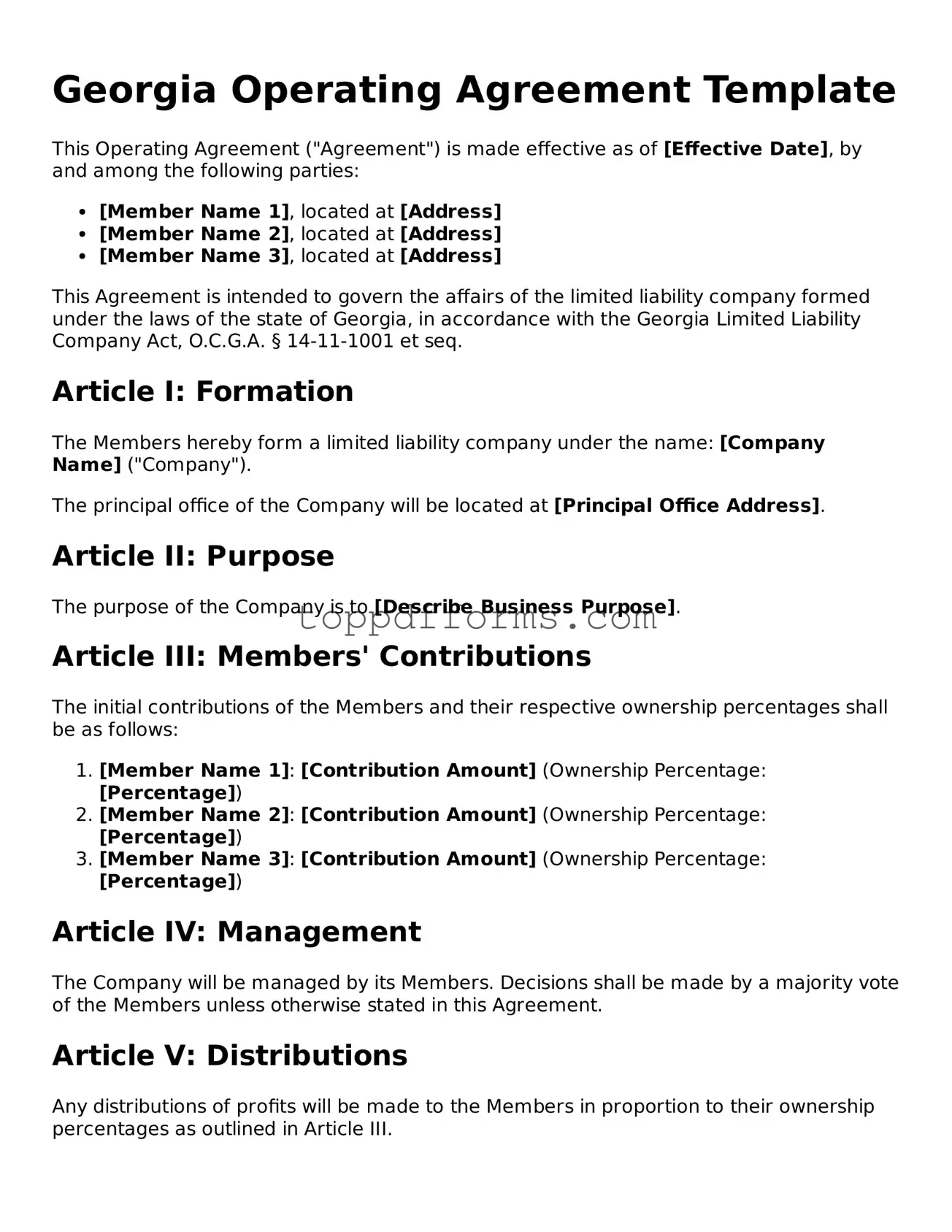Operating Agreement Document for Georgia State
Things You Should Know About This Form
What is an Operating Agreement in Georgia?
An Operating Agreement is a legal document that outlines the ownership and operating procedures of a limited liability company (LLC) in Georgia. It serves as an internal guide for the members of the LLC, detailing how the business will be managed, how profits and losses will be distributed, and how decisions will be made. While not required by law, having an Operating Agreement is highly recommended to clarify the roles and responsibilities of each member and to help prevent disputes in the future.
Is an Operating Agreement required in Georgia?
No, Georgia does not legally require LLCs to have an Operating Agreement. However, it is a good practice to create one. Having an Operating Agreement can provide structure and clarity for your business operations. It can also help establish credibility with banks and investors, showing that your business is organized and professional.
Who should draft the Operating Agreement?
What should be included in the Operating Agreement?
An Operating Agreement should include several key components. These typically consist of the LLC's name and address, the purpose of the business, the names and contributions of the members, how profits and losses will be allocated, and the procedures for decision-making. Additionally, it should outline how to handle member changes, such as adding or removing members, and how to dissolve the LLC if necessary.
Can the Operating Agreement be changed after it is created?
Yes, the Operating Agreement can be amended or changed after it has been created. The process for making changes should be outlined in the original document. Typically, a certain percentage of members must agree to any amendments. It’s important to keep the Operating Agreement updated to reflect the current structure and operations of the LLC.
PDF Overview
| Fact Name | Description |
|---|---|
| Purpose | The Georgia Operating Agreement outlines the management structure and operating procedures for a limited liability company (LLC) in Georgia. |
| Governing Law | This agreement is governed by the Georgia Limited Liability Company Act, specifically O.C.G.A. § 14-11-101 et seq. |
| Members | All members of the LLC should be included in the agreement, detailing their rights and responsibilities. |
| Management Structure | The agreement can establish either member-managed or manager-managed structures, depending on the members' preferences. |
| Amendments | Provisions for amending the Operating Agreement can be included, allowing flexibility as the LLC evolves. |
| Dispute Resolution | It often includes methods for resolving disputes among members, such as mediation or arbitration. |
| Tax Treatment | The agreement can specify how the LLC will be taxed, which can affect the members' personal tax obligations. |
| Effective Date | The Operating Agreement typically includes an effective date, which is when the terms become enforceable. |
Common mistakes
When completing the Georgia Operating Agreement form, individuals often encounter several common mistakes that can lead to complications down the line. One frequent error is failing to clearly define the roles and responsibilities of each member. Without this clarity, misunderstandings may arise regarding who is responsible for specific tasks or decisions.
Another mistake involves neglecting to outline the process for adding or removing members. This omission can create challenges if the business needs to adjust its membership in the future. It is essential to include a clear procedure to ensure that all members are aware of how changes will be handled.
Many individuals also overlook the importance of specifying the distribution of profits and losses. If this section is vague or incomplete, it can lead to disputes among members. Clearly stating how profits and losses will be shared helps to prevent conflicts and ensures that all members have the same expectations.
Additionally, some people fail to address how decisions will be made within the company. Not specifying whether decisions require a majority vote, unanimous consent, or another method can lead to confusion and disagreements. Establishing a clear decision-making process is crucial for smooth operations.
Another common mistake is not including a provision for resolving disputes. Without a clear process for handling disagreements, conflicts may escalate and become more difficult to manage. Including a dispute resolution mechanism can help maintain a positive working relationship among members.
Finally, individuals sometimes forget to review and update the Operating Agreement regularly. As businesses evolve, changes in membership, operations, or goals may necessitate updates to the agreement. Regular reviews ensure that the document remains relevant and effective in guiding the business.
Other Common State-specific Operating Agreement Forms
Open a Llc - It may include auditor requirements for financial checks.
Landlords seeking to address lease violations can utilize the "critical Notice to Quit" form to ensure proper communication and compliance with state laws. This form is vital for initiating the process of eviction, allowing landlords to formally notify tenants of their infractions while granting them the opportunity to rectify the situation. For more information, visit the critical Notice to Quit page.
How to Write an Operating Agreement - By defining member duties, the Operating Agreement helps in avoiding overlap and confusion in responsibilities.
